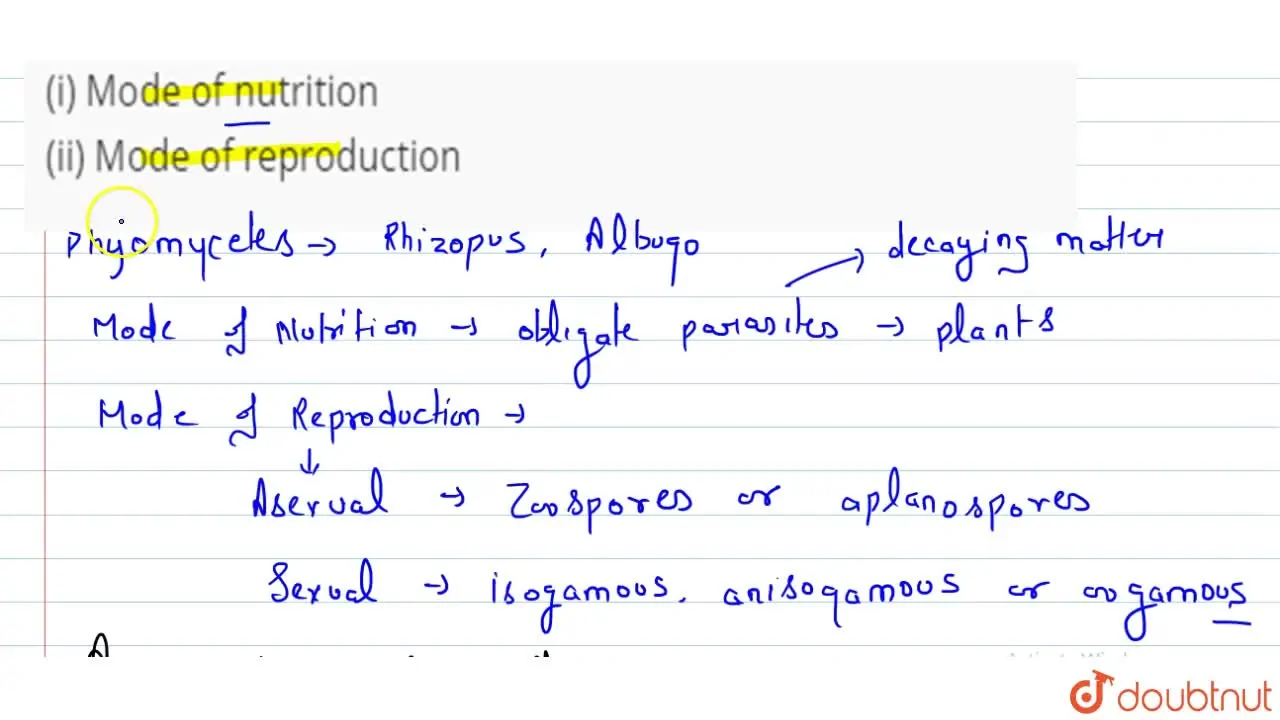Give a comparative account of the classes of Kingdom Fungi under the following:
(i) Mode of nutrition
(ii) Mode of reproduction
Video Solution
Text Solution
(A) Phycomycetes: This group of fungi includes members such as Rhizopus, Albugo, etc.
(i) Mode of nutrition
They are obligate parasites on plants or are found on decaying matter such as wood.
(ii) Mode of reproduction
Asexual reproduction takes place through motile zoospores or non-motile aplanospores that are produced endogenously in sporangium.
Sexual reproduction may be of isogamous, anisogamous, or oogamous type. It results in the formation of thick-walled zygospore.
(B) Ascomycetes: This group of fungi includes members such as Penicillium, Aspergillus, Claviceps, and Neurospora.
(i) Mode of nutrition
They are sporophytic, decomposers, parasitic or coprophilous (growing on dung).
(ii) Mode of reproduction brgt Asexual reproduction occurs through asexual spores produced exogenously, such as conidia produced on conidiophores.
Sexual reproduction takes place through ascospores produced endogenously in saclike asci and arranged inside ascocarps.
(C) Basidiomycetes: This group of fungi includes members such as Ustilago, Agaricus and Puccinia.
(i) Mode of nutrition
They grow as decomposers in soil or on logs and tree stumps. They also occur as parasites in plants causing diseases such as rusts and smuts.
(ii) Mode of reproduction
Asexual reproduction takes place commonly through fragmentation. Asexual spores are absent.
Sex organs are absent but sexual reproduction takes place through plasmogamy. It involves fusion of two different strains of hyphae. The resulting dikaryon gives rise to a basidium. Four basidiospores are produced inside a basidium.
(D) Deuteromycetes: This group of fungi includes members such as Alternaria, Trichoderma, and Colletotrichum.
(i) Mode of nutrition
Some members are saprophytes while others are parasites. However, a large number act as decomposers of leaf litter.
(ii) Mode of reproduction
Asexual reproduction is the only way of reproduction in deuteromycetes. It occurs through asexual spores called conidia.
Sexual reproduction is absent in deuteromycetes
|
Updated on:21/07/2023
Related Playlists
Similar Questions
Mode of nutrition in fungi is-
View SolutionWhich of the following modes of nutrition is most primitive?
View SolutionWhich of the following is not correct regarding sexual reproduction ?
View SolutionThe first living organism had following mode of nutrition
View SolutionWhich of the following are correctly matched with their mode of reproduction ?
 View Solution
View SolutionWhich of the following plant and its mode of nutrition is not correctly matched
View SolutionOne of the following does not have parasitic mode of nutrition
View SolutionWrite notes on : (i) Modes of transmission of AIDS (ii) Polio.
View SolutionThe mode of nutrition among fungi is
View SolutionWhat is the mode of nutrition in fungi ?
View Solution


